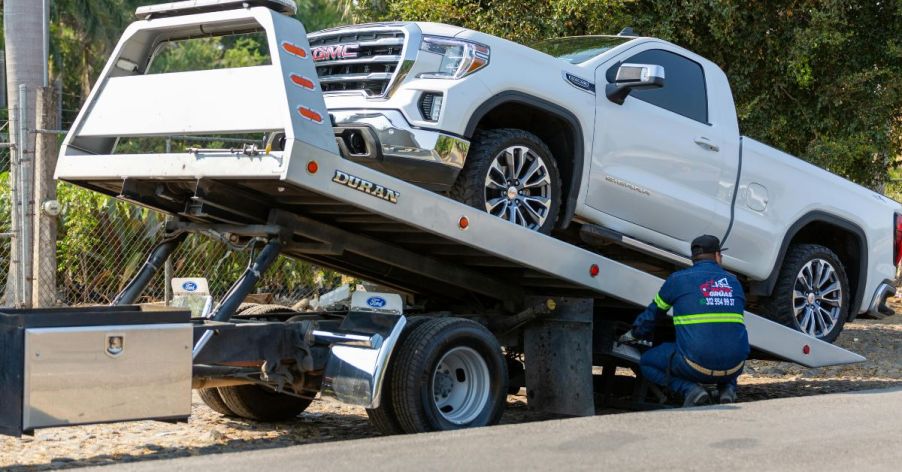
15 Common Mistakes People Make While Towing A Vehicle

Towing a vehicle may seem straightforward, but even experienced drivers can overlook critical details that affect safety and performance. Simple oversights like neglecting trailer brakes or improper load distribution can have serious consequences. Here are 15 common towing mistakes and easy solutions to help you avoid them confidently and safely.
Overloading the Trailer

Overloading a trailer is one of the most common towing mistakes. Always check the trailer and towing vehicle’s Gross Vehicle Weight Rating (GVWR) to avoid this. Distribute the load evenly and ensure weight is placed over the trailer axles.
Neglecting Proper Tongue Weight

The tongue weight is important for stable towing. If it’s too light or heavy, the trailer may sway or cause the rear of the towing vehicle to sag. Use a tongue weight of 10-15% of the trailer’s total weight.
Using the Wrong Size Hitch Ball

A ball that is too small for the trailer’s coupler can cause the trailer to detach, leading to an accident. Ensure that the hitch ball size matches the coupler, and check the ball’s weight rating to ensure it can handle the load.
Forgetting to Check Tire Pressure

For safe towing, the tires on the towing vehicle and trailer must be properly inflated. Over-inflated or under-inflated tires can cause tyre rupture or poor handling. So, check the tire pressure regularly before every trip to ensure it matches the recommended levels.
Not Using Trailer Brakes

Although many trailers have a brake system, some drivers neglect connecting or adjusting them. Not using trailer brakes puts excessive strain on the towing vehicle’s brakes. When towing, connect the trailer’s brake system and use a brake controller, adjusting it accordingly.
Ignoring Trailer Lights and Signals

Faulty or missing trailer lights create a safety hazard, as other drivers may not see brake signals or turn indicators. Regularly inspect all trailer lights, including brake, turn, and running lights. Inspect all wire connections to ensure proper connection and functioning before each trip.
Not Understanding Towing Capacities

Some drivers underestimate or ignore their vehicle’s towing capacity. This can exert unnecessary strain on the engine, transmission, and brakes. Consult the owner’s manual to confirm your vehicle’s towing limits and ensure the trailer’s weight, including cargo, is within that range.
Failing to Adjust Mirrors

Without proper mirror adjustment, drivers won’t have adequate visibility of the trailer and surrounding traffic, making lane changes and reversing dangerous. Use towing mirrors that extend outward and provide a clear view of the trailer and adjacent lanes. Regularly adjust them to avoid blind spots.
Driving Too Fast

Speeding while towing significantly increases stopping distances and decreases control, especially in emergencies. Moreover, trailers are prone to swaying at higher speeds. Therefore, stay well below the speed limit, typically about 55-65 mph, and give yourself extra space to stop.
Not Using Safety Chains Properly

Safety chains act as a backup if the trailer detaches from the hitch. However, many drivers either fail to use them or attach them incorrectly. The chains should be crossed under the tongue of the trailer and attached securely to the towing vehicle.
Improper Trailer Alignment While Hitching

If the trailer and vehicle are not properly aligned when hitching, it can wear out the hitch, cause damage, or make the connection insecure. Before moving, align the car squarely with the trailer, and use a spotter or camera if needed to guide you into position.
Not Practicing Trailer Maneuvering

Towing a trailer significantly alters a vehicle’s maneuvering abilities, particularly if you’re turning and reversing. Many people don’t practice enough before hitting the road. To avoid accidents, take time to practice backing up, turning, and parking in an empty lot before your trip.
Failing to Secure the Load Properly

An unsecured load can shift during transport, endangering the operator and the load. Use appropriate straps, chains, or ropes to secure the load. Also, check periodically during long trips to ensure nothing has shifted. Tie-down points and anchoring heavier items can also be helpful.
Not Using Tow Mode or Transmission Settings

Various vehicles have a tow mode or specific transmission settings designed to improve towing performance. Failing to engage the settings can lead to overheating, poor fuel economy, and excessive strain on the transmission.
Towing Without Proper Insurance Coverage

Some drivers assume their regular auto insurance covers towing, but this is not always true. Towing accidents or damages to the trailer may not be fully covered under standard policies. Discussing with your insurance provider will help determine if you have the appropriate coverage for towing.


